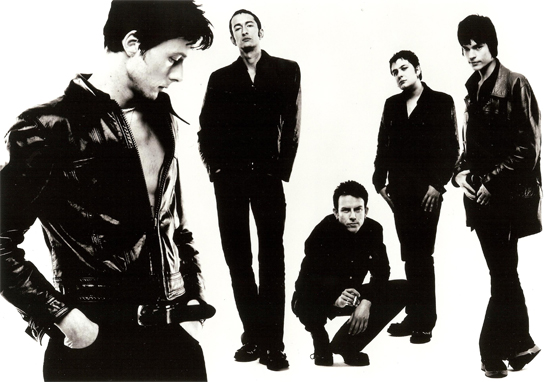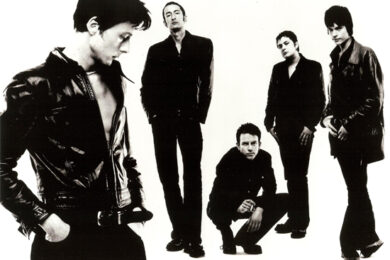It’s one and a half decades since Suede’s only previous appearance at the Royal Albert Hall, a show they struggled to sell out. Suede in 1995 were generally regarded as finished, kaput; as a musical force they had ceased to be.
Only three years before they’d been hailed as "The Best New Band In Britain". Their third single had gatecrashed the top ten, an almost unheard of achievement for an independent act in those days; their eponymous album entered the charts at number one, turned gold in its first week and was the fastest selling debut since Frankie Goes To Hollywood’s Welcome to the Pleasuredome in 1984. Not long afterwards they won the Mercury Music Prize – and promptly donated the prize money to cancer research. They were tarts with hearts at the top of the charts.
It was all too much too soon. About nine tenths of the way through the recording of their sophomore album, Dog Man Star, a preposterously ambitious, sprawling one-hour suite, Bernard Butler, widely regarded as the best guitarist since his idol Johnny Marr, had left the band in circumstances described at the time as "macabre". And that, it was assumed, was that. But Suede, and precocious frontman Brett Anderson in particular, always had a stubborn streak. Suede would simply carry on as if nothing had happened. The album was finished with minimum fuss – Anderson and an unnamed session musicians filling in the missing guitar parts – and Suede popped a small ad in the music papers that pretty much said "Genius guitarist wanted, influences: Suede".
To widespread derision the plucky candidate who got the job was a 17 year-old schoolboy from Dorset called Richard Oakes. Within weeks he was appearing on Top of the Pops, with the ignoble task of miming along to Butler’s guitar work on the first single from the album. Said release tickled the top 20 then promptly disappeared before anybody had noticed. Suede’s Nostradamus-like portents of armageddon sat ill in a chart being cheerily brightened by the beery bravado of arch rivals Blur and their boorish northern cousins Oasis. Suede fled the Britpop party they had inadvertently helped to create and toured the arse end of Europe with fellow outcasts Manic Street Preachers, who were having a few problems of their own at that time. "It felt strangely apt that we were playing places like Belgium and Holland," Anderson recalled later. "Like weird deposed kings."
Suede had their collective noses rubbed in it further when, exhausted, they eventually returned to the UK to find the airways dominated by an estranged colleague. Bernard Butler had scored a massive hit via his unlikely collaboration with former Thieves vocalist David McAlmont which, with its defiant chorus of "Yes I do feel better!" sounded like nothing less than two giant jubilant fingers stuck up at his erstwhile chums. Just in case anyone didn’t get the picture, Suede’s big comeback show at the Albert Hall was previewed with a press interview and photoshoot held in a gentleman’s convenience. The band were quite literally down the toilet.
Of course the 5,000 diehards who witnessed Suede at the Albert Hall that night knew this most certainly wasn’t the case. Those long months of touring had sharpened the new line-up into a ferocious live act. And even the most cynical observer would be pushed to deny that here was a great band playing great songs. The only trouble was, these great songs were written in part by someone who was no longer there.
What the cynics failed to recognise, however, was that those songs were collaborations, and that Anderson’s contribution was far greater than simply "yelping about gay animal sex" over Butler’s carefully crafted masterpieces. Painfully aware that his capricious collaborator could skedaddle at any minute, Anderson had been secretly stockpiling a small arsenal of his own compositions since the recording of the first album. Two of them – ‘By The Sea’ and ‘Lazy’ – would make it onto album number three.
Suede had a couple of other aces up their sleeves. Bernard Butler may have dismissed his teenage replacement as a "talentless clone" but those paying close attention were coming to the conclusion that Richard Oakes was something of a genius himself. Effortlessly replicating Butler’s own dazzling riffs to perfection, he had already contributed to a brace of fine b-sides. The first of those – ‘Together’ – was written in a Hamburg hotel when the rest of the band locked him in his room and told him not to come out until he’d written a hit. Encouragingly, Together was promoted to double A-side on the vinyl of the final single from Dog Man Star. It was a promising hint of what was to come.
And then there was Neil. Neil Codling was a cousin of drummer Simon Gilbert who turned up at Dave Stewart’s recording studio in Crouch End where the band were rehearsing to borrow a suit and ended up joining "by osmosis". Chain-smoking, snake-hipped and blessed with razor blade cheekbones, Neil was a Suede song made flesh. On piano, handclaps and the occasional backing vocal, he was unveiled to the public at a secret show for the band’s fanclub at the Hanover Grand in January 1996. The reinvigorated line-up showcased a short but vital clutch of new material without a Butler song in earshot. "A set that says ‘no need’", observed one journalist sagely. Indeed, such was the band’s new found confidence that it would be many months before they deigned to reintroduce some of the pre-Oakes oldies back into their live act.
By this time, recording of the album – at one point going under the unlikely working title of Old People Make Me Sick – was steaming ahead with long-time producer Ed Buller at the controls. Buller’s earlier production work had been a major factor in the rift between Bernard Butler and the rest of the band. As far as the producer was concerned, this time it was personal. "Ed was totally up for it," recalled Anderson’s trusty lieutenant, bass player Mat Osman. "He was really keen on using all those devices: the big repeated end, the handclaps, the straightforward chorus, make it big and obvious."
The band too were keenly focused on making the record a short, sharp shock of pop thrills. "Just ten hits," became the motto. When Buller asked Anderson if he had a title for one of the latest songs, he immediately replied, "If it’s a single it’ll be called ‘Lovely Day’. If it’s not a single I’ll think of something clever." That song eventually became ‘Picnic By The Motorway’, but the statement says a lot about the burning ambition at the heart of the record. Never again would an obvious single with a refrain that repeatedly went "I’m losing myself" be burdened with a title like ‘New Generation’.
There was a new found sense of playfulness and collaboration at work too. Whereas Dog Man Star had been "written by post" according to Anderson, the new material was far more celebratory in both its development and execution. So thrilled was Anderson with a rough mix of ‘Lazy’ that he played the song on an endless loop at top volume from his bright new maisonette on Chesterton Road in Notting Hill until an unfortunate neighbour had to beg him to turn it off, adding that his mother had just passed away.
Mat Osman remembered dropping off Richard Oakes at his flat with the jokey threat: "If you don’t write us a top ten single I’m going to give you a dead leg!" Oakes duly obliged with one of his more enduring riffs and gave it the working title ‘Dead Leg’. That eventually became Beautiful Ones which would become one of the band’s biggest ever hits and a perennial favourite of indie discos worldwide. There was a whole series of songs written under similar duress with provisional titles inspired by various other playground tortures: ‘Wedgie’ and ‘Chinese Burn’ being another two that Oakes remembers, while Codling’s ‘The Chemistry Between Us’ was originally known as ‘GBH’.
As summer approached, the mood in the Suede camp was good. Then one day manager Charlie Charlton bounded into the office in a rambling old warehouse in Old Street, jabbing a cassette into the stereo and shouting, "listen to this!" The song was lumbered with the unprepossessing title ‘Pisspot’, but would soon be known to radio listeners across the country and beyond as Trash. With a similar euphoric rush to ‘Beautiful Ones’ but an even more immediate chorus and an audible effervescence buffed up by Buller’s pop sheen, ‘Trash’ was an obvious smash whose outsider-embracing lyrics about tasteless bracelets and cellophane sounds were perfectly matched by a rejuvenated band at the top of their game. ‘Trash’ ripped up the charts to number three and became Suede’s biggest ever hit, selling in excess of 60,000 copies and dominating the airwaves that summer.
The album followed on September 2nd. It needed a title that encapsulated the orgasmic thrill of the record but also said something about the band’s Lazarus-like return from the dead. Idly half-watching Sky News one day, Anderson saw two words repeatedly flash up on the bottom of the screen: "Coming Up". It was perfect: sex, drugs and "fuck you, we’re back!"
Coming Up brushed aside all opposition and shot straight to the top of the album charts. Within a year it had sold something like half a million copies in the UK – more than both the previous Suede albums combined – but signifcantly it sold more than twice that overseas. Those long months touring the nowhere towns of northern Europe and beyond had paid off. No fewer than five singles were plucked from the album – exactly one half of the LP – every single one of them went top ten, a record for a British band at that time. Suede were not only a gang who were back with a bang, they were bigger than they ever were.
Of course, those who come up must also come down, and like a clubber’s first experience with ecstasy, Suede would never quite hit those dizzying heights again. But as the 1996 vintage line-up prepares to return to the Royal Albert Hall for a concert in aid of the Teenage Cancer Trust next week (a show that incidentally sold out in seconds this time around), those who inevitably harp that a Suede without Butler is no Suede at all would do well to be reminded that doomsayers said exactly the same thing 15 years ago. They were wrong then and they’re wrong now. Hysteria has a funny way of repeating itself.
David Barnett is author of Love & Poison: The Authorised Biography _have a look at the book here_



